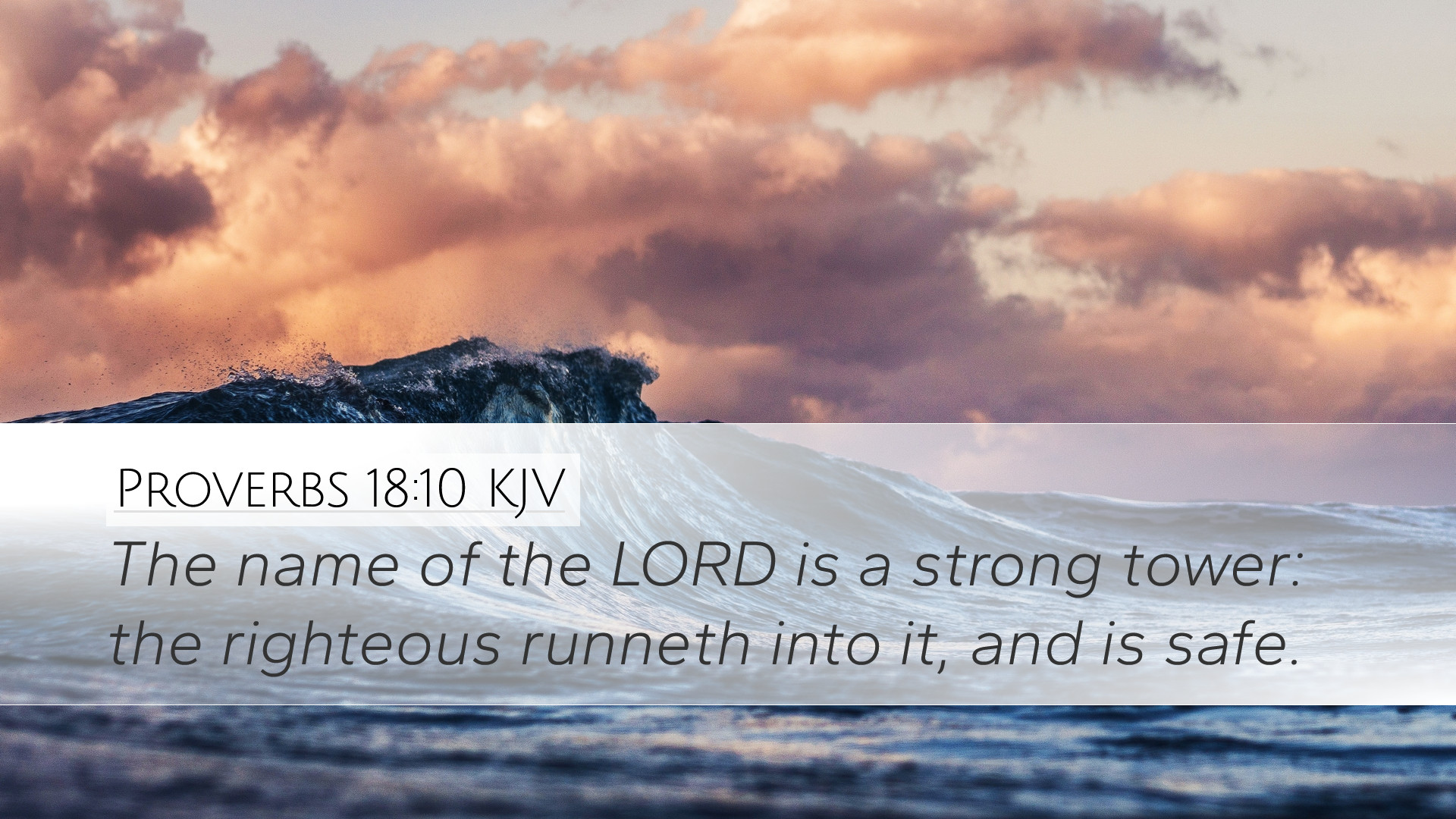Commentary on Proverbs 18:10
Verse: “The name of the Lord is a strong tower: the righteous runneth into it, and is safe.” (Proverbs 18:10)
Introduction
The Book of Proverbs, attributed chiefly to Solomon, is a compilation of wisdom literature offering insights into life, morality, and the nature of God. Proverbs 18:10 presents a vivid metaphorical image, contrasting the security granted by the divine with the fragility of worldly means. This verse encapsulates profound theological truths that resonate with believers and provides rich material for reflection and application.
Commentary Insights
1. The Name of the Lord
Albert Barnes emphasizes that the name of the Lord signifies His character and attributes. In biblical theology, a name encapsulates the essence of a person, and thus the name of the Lord represents His power, holiness, and reliability.
Adam Clarke elaborates that invoking the name of the Lord is not merely a verbal utterance but an act of faith in His nature and willingness to protect and save. The name stands as an assurance of His presence and assistance in times of trouble.
2. A Strong Tower
The metaphor of a "strong tower" symbolizes security and safety. Matthew Henry notes that towers serve as a refuge, fortified against assaults and dangers. In the ancient world, cities fortified their walls with towers, representing the strength and protection found in God.
Adam Clarke further connects the idea of a strong tower to the omnipotence of God; when adversity strikes, the faithful can find refuge in His unassailable strength.
3. The Righteous Run to It
This verse highlights the response of the 'righteous'—those who align their lives according to God’s precepts. Albert Barnes points out that the righteous actively seek God’s refuge in moments of danger, illustrating their faith and trust in Him. This running signifies urgency and recognition of the need for divine assistance.
Matthew Henry adds that this act of running implies both a desire and a necessity; the righteous do not hesitate to approach God, knowing that He is their source of safety amidst trials.
4. Safety in God
The concluding phrase, "and is safe," encapsulates the promise of protection. Adam Clarke interprets this spiritual safety as not merely an absence of danger but a profound state of peace that comes from trusting in God’s sovereignty and providence.
Matthew Henry enriches this sentiment by emphasizing that though the world may be tumultuous, those who find refuge in the Lord will experience tranquility and security that surpasses worldly understanding.
Theological Implications
Proverbs 18:10 provides a crucial reflection on the nature of God as a protector and the appropriate response of believers. It emphasizes that true safety is found not in human wisdom, strength, or resources, but in a personal relationship with God.
Faith and Trust
The act of running towards God, as mentioned in the verse, is an expression of faith. Albert Barnes discusses how faith is not passive; it is an active engagement with God. The righteous demonstrate their understanding of God’s nature by seeking refuge in Him during troubling times.
Assurance in Adversity
The promise of safety acts as an assurance during adversity. Matthew Henry points out that this is particularly relevant for pastors and theologians who guide others through hardships, reminding them that the true epicenter of safety lies in the relationship with God.
Practical Applications
For pastors, students, and theologians, Proverbs 18:10 fosters rich applications in pastoral care, personal faith, and community resilience.
1. Pastoral Care
In counseling situations, acknowledging God’s role as a strong tower can help congregants find hope and comfort. Albert Barnes encourages ministers to remind their flock that God is an ever-present help in times of trouble.
2. Personal Faith
Students of theology can use this verse for personal reflection, considering how they seek refuge in God during personal trials. Adam Clarke suggests that understanding God as a mighty fortress can transform how believers navigate life's uncertainties.
3. Community Resilience
As communities face collective challenges, the metaphor of a strong tower can serve as a rallying point, encouraging solidarity in seeking divine assistance. Matthew Henry reminds believers that together they can run to their strong tower, building resilience amidst adversity.
Conclusion
Proverbs 18:10 is a profound declaration of God’s strength and protection. The blessing of safety granted to the righteous who take refuge in Him encourages a life of faith rooted in divine assurance. It calls out to believers, urging them to recognize God as their ultimate source of strength andsecurity, a reality that is particularly poignant in the face of life's challenges.
This rich commentary on Proverbs 18:10 serves as both a theological anchor and a practical guide for all who seek deeper insights into the nature of God and their relationship with Him.


